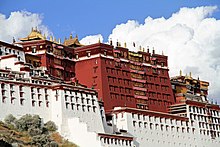1690s in architecture
Appearance
This article needs additional citations for verification. (February 2015) |
| |||
|---|---|---|---|
| Buildings and structures+... |
| 1680s · 1690s in architecture · 1700 |
| Architecture timeline |
Buildings and structures
[edit]Buildings
[edit]
- 1690
- The Sindone Chapel in Turin, Piedmont, designed by Guarino Guarini is completed.
- The Barrage Vauban, designed by Vauban and built by Jacques Tarade in Strasbourg, France, is completed
- 1690–1700 – Two Baroque palaces in Vilnius, Sapieha Palace and Slushko Palace, designed by Pietro Perti, are erected.
- 1689–1691 – Swallowfield Park, near Reading, Berkshire, England, designed by William Talman, is built.
- 1691–1697 – Branicki Palace, Białystok, Poland, designed by Tylman van Gameren, is built.
- 1692
- St. Kazimierz Church, Warsaw, Poland, designed by Tylman van Gameren, is completed.
- Theatine Church, Munich, Bavaria, designed by Agostino Barelli in 1662, is substantially completed to the design of Enrico Zuccalli.
- 1694
- The Potala Palace in Lhasa is completed by construction of the Potrang Marpo ('Red Palace').
- The Radziejowski Palace in Nieborów, Poland, designed by Tylman van Gameren, is built.
- The Chapel of the Holy Shroud in Turin, begun by Amedeo di Castellamonte in 1668, is completed to the design of Guarino Guarini.
- 1695 – Wren Library, the library of Trinity College, Cambridge, England, designed by Christopher Wren, is completed.

- 1695–1699 – Craigiehall, near Edinburgh, Scotland, designed by Sir William Bruce.
- 1696
- Main façades of Chatsworth House completed to designs of William Talman in a pioneering English Baroque style.
- Library of The Queen's College, Oxford, designed locally, is completed.[1]
- Construction of Schönbrunn Palace in Vienna to the design of Johann Bernhard Fischer von Erlach begins.
- 1697 – Trinity Cathedral in Solikamsk, Russia (begun 1683), is completed.
- 1698 – Fortified town of Neuf-Brisach in Alsace, designed by Sébastien Le Prestre de Vauban, is begun.
- 1699 – Castle Howard in Yorkshire, England (completed 1712), designed by Sir John Vanbrugh and Nicholas Hawksmoor, is begun.
Events
[edit]- 1696 – Window tax is introduced in England.
- 1697: May 7 – The 13th century royal Tre Kronor ("Three Crowns") castle in Stockholm burns to the ground; the plan for the replacement Stockholm Palace by Nicodemus Tessin the Younger is presented a few weeks later.
Births
[edit]- 1690 – Richard Cassels, German-born architect working in Ireland (died 1751)
- 1691
- June 17 – Giovanni Paolo Panini, Italian painter and architect (died 1765)
- September 1 – James Burrough, English academic, amateur architect and antiquary (died 1764)
- 1692 – Pietro Antonio Trezzini, Swiss architect working in Saint Petersburg (died after 1760)
- 1693
- January 29 – Henry, Lord Herbert, later Earl of Pembroke, English courtier and architect (died 1749)
- September 13 – Joseph Emanuel Fischer von Erlach, Viennese architect (died 1742)
- 1694
- April 25 – Richard Boyle, 3rd Earl of Burlington, English aristocrat and architect (died 1753)
- September 26 – Martin Schmid, Swiss Jesuit missionary, musician and architect working in Bolivia (died 1772)
- 1695
- April 19 – Roger Morris, English architect (died 1749)
- October 23 – François de Cuvilliés, Walloon-born dwarf and architect working in Bavaria (died 1768)
- 1696: September 14 (bapt.) – Batty Langley, English garden architect (died 1751)
- 1698: October 23 – Ange-Jacques Gabriel, French architect (died 1782)
- 1699
- Edward Lovett Pearce, Irish architect (died 1733)
- (probable date) – Matthew Brettingham, English architect (died 1769)
Deaths
[edit]- 1691: February 8 – Carlo Rainaldi, Roman architect (born 1611)
References
[edit]- ^ Tyack, Geoffrey (1998). Oxford: An Architectural Guide. Oxford University Press. ISBN 0-14-071045-0.
